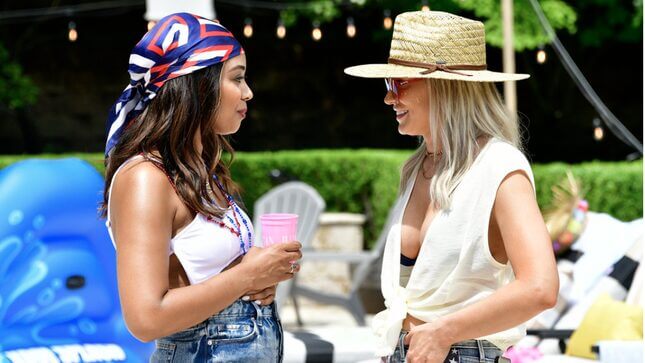‘Summer House’ Addresses the Race ‘Elephant in the Room’ After Five Long Years
Castmates Ciara Miller and Mya Allen initiated a conversation about microaggressions and allyship in reality TV that was…really mature?
EntertainmentTV

“Summer should be fun!!!!”
That’s the war-cry Kyle Cooke—long-time castmate and near-40-year-old Peter Pan of Bravo’s Summer House—wails each time petty drama fractures the house of twenty- and thirty-somethings whilst they “summer” in the Hamptons.
Summer House is ostensibly about nothing at all, which is why I’ve been watching it for five years. My brain immediately turns off as it witnesses this group of mouthy New Yorkers sit in four hours of traffic (each way) in the name of blacking out and fucking randos they met at Southampton Social Club. The drama is generally born out of the weekly group drinking sessions, which usually involve women flashing each other and then yelling at pre-sobriety Carl Radke for playing them like a bunch of tanned, bikini-adorned fiddles. Indeed, the entire show is pure ecstasy in that it is truly just a bunch of pretty people taking jello shots, throwing America-themed ragers, and screaming “WOO!” No one asked for this (not even the town of East Hampton), and yet, I would sooner shave off my eyebrows than miss an episode.
This is why I was shocked when an exchange in the fifth episode of season 6 snapped me out of my catatonic watching state. Summer should be mindless. Summer should be a time for Kyle to disassociate from his $4 million in debt and marital problems, but six seasons in, thanks to the show’s two Black housemates, summer will be…full of mature and meaningful discussions about race.
The show that Ciara Miller (Season 5) and Mya Allen (Season 6) initially walked into was too busy chronicling emotionally stunted adults to notice that it had taken four years to cast a Black housemate in a city that is pretty fucking diverse. By design, Summer House touched upon alcoholism, grief, and strained parental relationships long before it dared to touch race; a conceit following the blueprint set forth by other Bravo shows that center on excessive drinking first and money flowing out the ass second.
Even in the morally depraved realm of reality television, which has faced its own sort of reckoning, race is now unavoidable. In just the last few years, we’ve seen former Bachelor-franchise host Chris Harrison pressured into leaving the shows he hosted for nearly two decades after defending contestant Rachael KirkConnell’s past racism; Bravo fired Vanderpump Rules stars Stassi Schroeder and Kristen Doute for calling the cops on their Black castmate for a crime she was not involved in; Real Housewives of Beverly Hills castmate Sutton Stracke was quick to morph into a Karen after telling her Asian costar that she “doesn’t see color;” while Dorit Kemsley, hoping to prove she knows people of color, said in that same season, “We’ve had a lot of people that work for us that are very multicultural…I’ve had a lot of Black and Hispanic and Filipino…These are some of the people who [my kids have] loved most in this world, are dark-skinned.”In Summer House, Allen had been subjected to several glaring microaggressions, some of which included Andrea “Italian Stallion” Denver blatantly ignoring Allen’s presence and calling her the wrong name despite having lived with her for a month, as well as Paige DeSorbo openly confusing Allen with Miller. Allen shared in a tearful beach chat with Miller that she felt ostracized as one of the few people of color in the house. This chat prompted the two women to sit the entire house down and have a candid conversation about race the following day.
“You cannot diversify a show that’s been historically white and not have a conversation like this,” Miller told Jezebel. “We couldn’t go another season without it. We can’t have multiple people of color and minorities in this house and still not talk about the elephant in the room.”
It was unlike anything I’ve ever seen on Summer House, or for that matter, on any reality show.
-

-

-

-

-

-

-

-

-

-

-

-

-

-

-

-

-

-

-

-

-

-

-

-

-

-

-

-

-

-

-

-

-

-

-

-

-

-

-

-








































